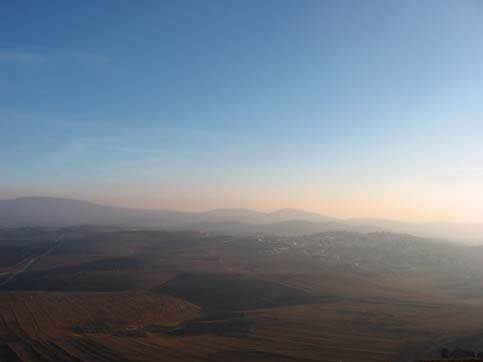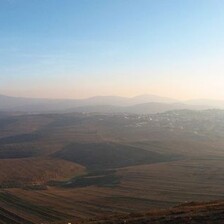Beirut 13 July 2006

Syrian TV images of the Israeli bombing of Beirut International Airport. Around the Arab world, people were glued to their television sets in horror at Israel’s decimation of the civilian infrastructure. (EI)
Israeli war planes are bombing Beirut. Over 50 Lebanese civilians have died since the Israeli military launched a major military offensive against Lebanon on Wednesday, July 12th. Bombs targeted civilian infrastructure throughout the country, including the key highways and bridges across southern Lebanon effectively halting all cross-country transportation.
Israeli has imposed a full out air, sea and land blockade on the entire country, bombing Beirut�s international airport and deploying war ships to patrol Lebanon�s waters. Streets in Lebanon�s capital are vacant, as Lebanese are glued to radios and TV�s while the buzzing of Israeli military planes emanates from the night sky.
Commentators on local TV have been calling the Israeli attacks, “the War of Bridges”, as over 10 major transport bridges have been bombed. Entire southern regions of Lebanon have been effectively isolated from the rest of the country, as the Israeli military maintains its attacks on the south.
Explosions hit Beirut’s southern suburbs home to the political headquarters of Hezbollah who has successfully captured two Israeli soldiers in a recent military operation, sparking the recent fury of Israeli attacks against Lebanon.
Sheikh Hasan Nasrallah, Secretary-General of Hezbollah, speaking at a nationally televised press conference yesterday stated that the Israeli prisoners would be released only through an exchange for Lebanese prisoners held in Israeli prisons brokered through indirect negotiations.

Lebanese civilians flee Israeli destruction in the south of the country. [Image: AP]
It is estimated that hundreds of Lebanese continue to be held in Israeli jails, the majority imprisoned during the large-scale indigenous resistance to Israel�s 22 year military occupation of southern Lebanon.
Lebanese political prisoners in Israel is a long-standing issue of national concern in Lebanon and has been frequently highlight by Hezbollah in the long list of historical injustices committed against the Lebanese people by Israel. Prisoners like Samir Kuntar, who has been held by Israel since 1979, illustrate the pressing issue of Lebanese prisoners in Israel.
Popular support for Hezbollah grows throughout the south of the country as Israeli planes continue striking civilian targets. On Lebanon�s major news channels interviews with residents in the south of the country, who hold recent memories of Israeli brutal occupation, have consistently voiced their endorsement of Hezbollah�s capture of Israeli soldiers.
New TV Lebanon featured a series of interviews with people in Southern Lebanon, where multiple villages were targeted in the recent bombings. One segment featured interviews revolving around the site of a bombed bridge, in which one local resident exclaimed, “even if with all this destruction we are in full support of the resistance and are willing to support the resistance until the end.”

The far south of Lebanon, bordering Israel, the site of many of the recent Israeli attacks in the country. [Image: Stefan Christoff EI]
While in Beirut voices exacerbated with Hezbollah�s recent military actions are present, as Prime-Minister Fouad Siniora and the Lebanese cabinet has officially distanced itself from Hezbollah calling for an immediate “comprehensive ceasefire”. A complaint to the U.N. has been filed by Lebanese government concerning Israel�s military action, while Israel has filed its own complaint about Hezbollah�s actions.
As international diplomacy efforts commence Israel continues to strike Lebanese territory, with the Foreign Ministers of Arab states calling an emergency meeting, while the U.N. Security Council has also called an emergency meeting. While U.S. President, George Bush strongly defended Israel�s attack on Lebanon as an act of self-defense.
Israel�s major military assault on Lebanon takes place as Palestinians in the Gaza Strip continue to suffer a major military siege. In recent weeks Israeli military forces have launched the largest military attack on the people of Gaza since the unilateral �withdrawal� of Israeli settlements in August 2005.
Direct parallels between the military escalation in Lebanon and the continuing occupation of Palestine have been consistently stated. Hezbollah directly cited the ongoing Israeli carnage in Gaza as a root reason for their military actions, as Lebanese quickly draw the connection between the Israeli siege and the occupation of Palestine.
Celebrations erupted in the Occupied Territories and in the Palestinian refugee camps of Lebanon after Hizbollah�s announcement of the successful capture of two Israeli soldiers.
As night falls on Lebanon, bombs continue to fall from the skies, and the tension on the streets of Beirut becomes more palatable as the Israeli government pledges to press forward with its assault on Lebanon. As the civilian death toll in Lebanon continues to rise, rage across the country and Middle East region continues to grow.
Related Links
This article was written for the Electronic Intifada by Sawsan Kalache and EI�s Stefan Christoff, who are both currently in Lebanon on a delegation organized by Tadmaon! a collective of activists from Montreal in an effort to build solidarity with social justice movements in Lebanon.





